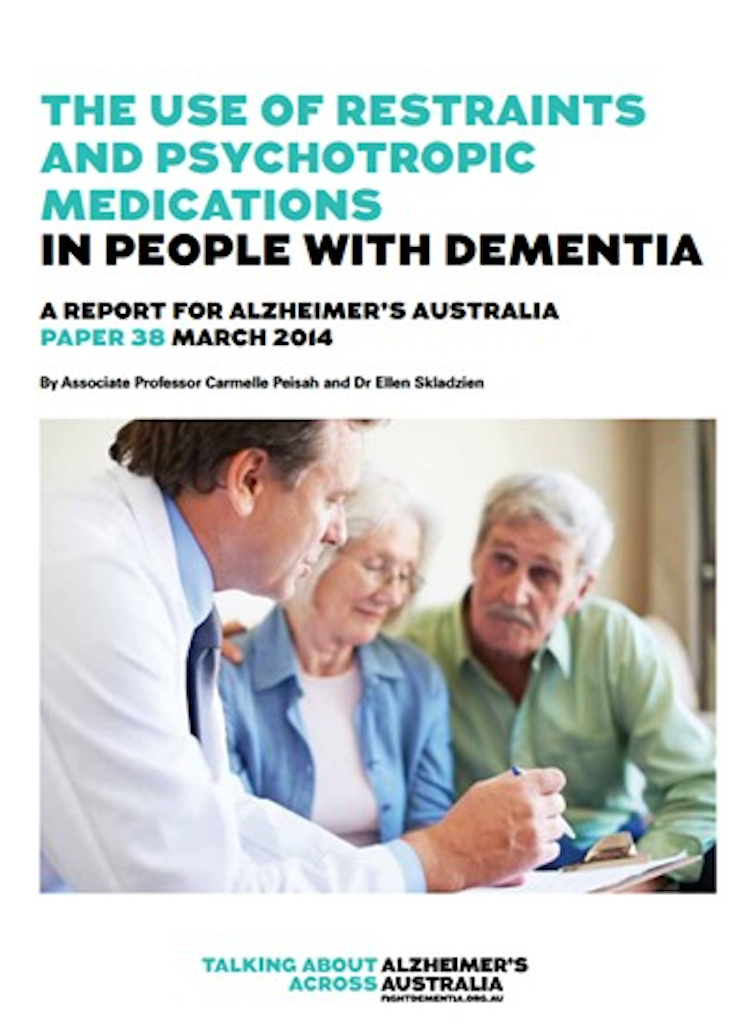Medications, physical restraints should be ‘last resort’
More must be done to educate aged care workers on the potentially dangerous side effects of psychotropic medications and restraint when caring for those living with dementia, according to a report launched by Alzheimer’s Australia today.

Ita Buttrose says medications and physical restraints should be a “last resort”.
The report titled The Use of Restraint and Psychotropic Medication in People with Dementia exposes that up to 80% of people with dementia and nearly half of those in residential aged care facilities are receiving psychotropic medications that, in some cases, are inappropriately prescribed.
It gives an evidence based review of the prevalence of the use of restraint, and the potential negative consequences and legal issues surrounding the use of psychotropic medication and physical restraints in people with dementia.
Ita Buttrose, Alzheimer’s Australia national president, says the report raises concerns that while aged care staff and carers often do their ‘best’, in many cases, psychotropic medications and physical restraints are the first line of response to challenging behavioural and psychological symptoms of dementia (BPSD).
“International data suggests only one in five people with dementia receive any clinical benefit from these medications,” Ms Buttrose says.
“We must ensure that the basic rights of a person with dementia are respected. Clinical guidelines indicate psychosocial approaches should be considered first, including person centred care and recreational therapies,” she claims, adding medications and physical restraints should be a “last resort”.
Nick O’Neill, former chair of the NSW Guardianship Tribunal, says if antipsychotic medications or physical restraints are to be used then informed consent needs to be obtained from the person if they still have capacity to do so.
“If they lack capacity, then the person's substitute decision maker may consent to antipsychotic medications if they are to be given as medical treatment but not if they are to be used as chemical restraints,” Mr O’Neill says.
“If medications are being used as chemical restraints or physical restraints are being proposed, a guardian must be appointed by a tribunal (empowered to appoint guardians) to consent to the use of the relevant form of restraint. However, the evidence suggests that appropriate consent, or the appropriate appointment and approval, is often not obtained.”
The report offers alternative approaches and recommendations on a way forward.
Ms Buttrose claims the federal government needs to support the aged care industry to better train and educate the workforce on person centred care, BPSD and non-pharmacological interventions.
“This would give carers of people with dementia and their families’ confidence that their loved ones are receiving high quality care,” she says.
Steve Teulan, UnitingCare Ageing director, claims while there has been growth in the knowledge of effective and compassionate care for people living with dementia in the past two decades, there remains much work to do by aged care providers and medical practitioners to put these learnings into practice.


“We know that a positive psycho-social model of care, combined with effective clinical practice in areas such as pain management, significantly reduces the incidence of behavioural symptoms which commonly lead to the prescription of psychotropic medications and restraints,” Mr Teulan says.
“One of the key elements in providing a supportive care environment is understanding and knowing the individual, being able to connect with them through their history, culture, beliefs, experiences and interests, and acknowledging the importance of their relationships and the knowledge and insights of their family members,” he adds.
Investment by aged care providers and adequate government funding for dementia education training, research and support will be vital to addressing the issues identified in this report, according to Mr Teulan.
NSW and ACT based aged care provider, UnitingCare Ageing, is now working with Alzheimer’s Australia to evaluate its practices in caring for people living with dementia and develop tailored education and training programs for our staff.
Read the key recommendations of The Use of Restraint and Psychotropic Medication in People with Dementia report.











![The new Aged Care Act exposure draft is slated for release in December of 2023, but advocates hope to see it rolled out on January 1, 2024. [Source: Shutterstock]](https://agedcareguide-assets.imgix.net/news/articles/wp/agedcareact__0811.jpg?fm=pjpg&w=520&format=auto&q=65)












Comments